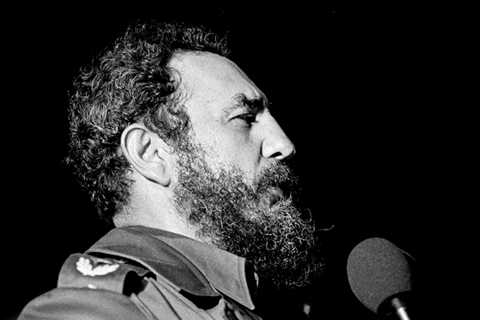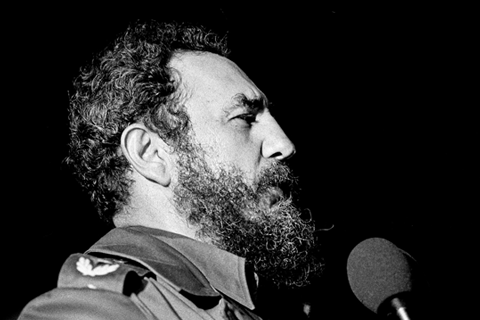TWIF Vol. 71
thinx archive
·5 min read

by Emma Glassman-Hughes | 12/01/2016
It’s been one hell of a month for the United States, and TBH, we deserve a lil’ break. This edition of TWIF is goin’ entirely global! Scroll down to check out some major ~*international only*~ feminist news, and maybe to help you turn off the Tr*mp-o-meter for a few delicious moments.
1. Fidel Castro Dies, Cubans Prepare For Future.

Fidel Castro, Havana, 1978 / Marcelo Mortecino
This week, one of the world’s most polarizing political leaders died at the age of 90. Fidel Castro, the dictator of Cuba who governed for 47 years, was a Marxist-Leninist Cuban nationalist who began his political career as a Communist revolutionary and radical youth. While the U.S. certainly has a (to put it lightly) turbulent relationship with Cuba, Castro was and is at once both widely celebrated and widely despised depending on where in the world you call home. For instance, in Miami, a city home to over one million Cuban expats, there were celebrations for days after his death was announced on November 25th. In parts of the “developing” world, however, Fidel had many fans; namely those who remembered how he aided anti-colonial revolutions for independence in countries like Angola and Namibia, which indirectly put pressure on the South African apartheid government. While in his home country, he repressed social and political freedoms like freedom of speech, and while he implemented horrific acts of violence against the LGBT+ community, he was widely admired by outsiders who appreciated how he, as the leader of such a small island nation, was uniquely willing to stand up to U.S. imperialist force. Many are hopeful now that his death will lead to a new era of progressive human rights restoration in Cuba, but the future remains unclear. TL;DR Castro was a complex dude and his death has made a lot of people feel-del a lot of things.
2. Colombian Government Strikes Peace Deal With FARC After 52-Year Civil War.
After 50+ years of civil war and bloody conflict, Colombia has finally reached a peace agreement this week between the establishment government and the insurgent rebels, known as FARC (Revolutionary Armed Forces of Colombia). Though it sounds rather non-controversial--I mean, who doesn’t want peace 50 years in the making??--this vote, which was on its second round after the measure was voted down earlier this fall, was pretty polarizing for the citizens of Colombia. Rural versus urban environments had a hand in shaping the vote on the peace deal, which makes sense when you consider how rural areas have historically been targets for violence and exploitation far more by FARC rebels than urban areas. In fact, when this vote was initiated in October, it was a pretty even split--urbanites generally voting in favor of the peace process largely for symbolic purposes, and pastoral types generally voting against this specific peace agreement with hopes that the deal would be revised for the second vote, to reflect a harsher stance against FARC. Not to mention the suspicion of anti-LGBT+ sentiment influencing the dissenting votes, too. So what does this mean for Colombian women and other members of marginalized groups in Colombia? Writers of the agreement were advised by a gender subcommission, which claims to be devoted to matters like increasing women’s access to rural land and other economic rights, as well as judicial and social rights for women, and ensuring that men and masculinity are addressed in discussions of gender. We’ll see how this goes, Colombia, but so far, this peace deal looks real cute on you.
3. Morocco Bars International Activists From COP22 Climate Change Summit.
Here’s somethin’ no one is really talkin’ about (other than how fun it is to remove the “g” from the ends of all your gerunds): Morocco’s 41-year colonization of Western Sahara. This occupation--hey, don’t blame me! He said it--came to a dramatic head this month as Suelma Beirouk, VP of the Pan-African Parliament and Western Saharan refugee, was denied entrance into the UN Climate Change Conference in Marrakech, Morocco. This political act has drawn attention not only to heightened government surveillance and intervention against innocent activists in Morocco but also to the occupation itself, as explained here by Hamza Hamouchene, a British-based Algerian activist for North African and West Asian issues. According to Hamouchene, the Moroccan monarchy is willing to take action in order to ensure that international audiences remain largely ignorant to the situation in Western Sahara; a situation which points to environmental exploitation and ethnic conflict between Moroccans and the indigenous Saharawi people, as well as environmental detriment throughout Morocco proper. This all unfolded shortly before International Day for the Elimination of Violence Against Women, for which state TV in Morocco aired a segment that teaches women how to effectively cover bruises given by abusive partners. Pretty Mor-awkward.
Miss-Me-Nots (at home and abroad)
Here's how Chinese feminists can influence the feminist anti-Tr*mp movement in the U.S.
2,000 veterans are showing up at Standing Rock to give the protesters a break?? We're crying so many happy tears?
UK's wage gap persists and it ain't pretty.
Also IDK here's Matthew McConaughey being cute.
by Emma Glassman-Hughes


